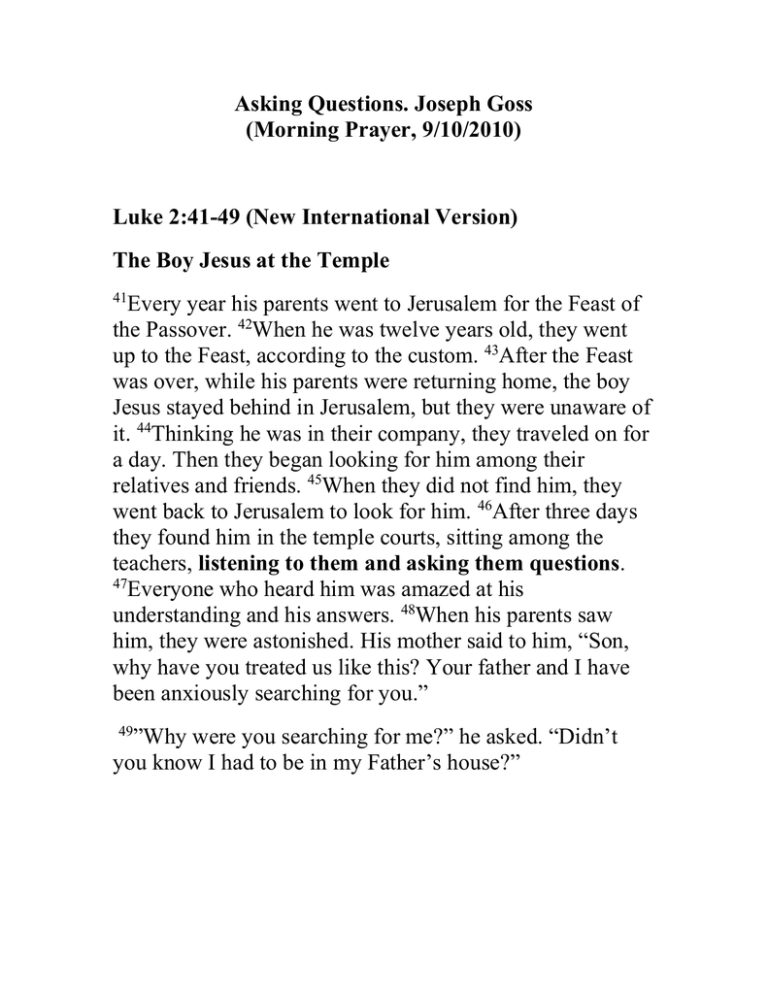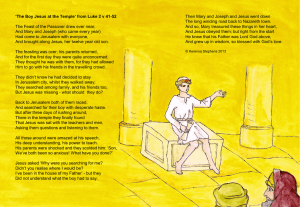Asking Questions. Joseph Goss (Morning Prayer, 9/10/2010) Luke 2:41-49 (New International Version)
advertisement

Asking Questions. Joseph Goss (Morning Prayer, 9/10/2010) Luke 2:41-49 (New International Version) The Boy Jesus at the Temple 41 Every year his parents went to Jerusalem for the Feast of the Passover. 42When he was twelve years old, they went up to the Feast, according to the custom. 43After the Feast was over, while his parents were returning home, the boy Jesus stayed behind in Jerusalem, but they were unaware of it. 44Thinking he was in their company, they traveled on for a day. Then they began looking for him among their relatives and friends. 45When they did not find him, they went back to Jerusalem to look for him. 46After three days they found him in the temple courts, sitting among the teachers, listening to them and asking them questions. 47 Everyone who heard him was amazed at his understanding and his answers. 48When his parents saw him, they were astonished. His mother said to him, “Son, why have you treated us like this? Your father and I have been anxiously searching for you.” ”Why were you searching for me?” he asked. “Didn’t you know I had to be in my Father’s house?” 49 Jesus asked questions, and so do we. We’re like him in that respect. But what is to be gained by asking questions? And what questions are we allowed to ask? Which ones are not allowed? What subject matter is out of the question? Our questioning begins at an early age. A child’s questions are unlimited: What’s that in the sky? Where does the train go? Why does that boy look that way? Why is that girl crying? Where is Jesus? Why does she ask about these things, and so many more? Simple curiosity or wonder (which maybe aren’t really so simple, when you think about them)? Suspicion? Maybe the child needs just a little more information before she trusts what she’s learned. Or maybe the very act of questioning allows her to gain some orientation in the world. Think of all the times you’ve probably heard a child ask this very simple question: “What’s that?” The answer may not be anything very interesting to you, but to the inquisitive child, it’s one more piece of the puzzle put in place. Often, it seems, nothing is off limits to a child’s questioning. That’s because the world is a mystery but we have to find how we fit into it. Even if you have an answer book that covers everything—and many of us believe we do have one—you still need to learn how to apply those answers to your unique life. The only text in the Bible that offers a glimpse into the young Jesus’ life is one that describes him asking questions of the religious authorities in Jerusalem. I wonder what questions he was asking. Do you think they were easy questions with obvious answers? I doubt it, given the “amazement” he reportedly provoked in the people around him. This was a child with insight comparable, perhaps superior to the scholars with whom he conversed. He amazed them, but I imagine he made them uncomfortable, too. Imagine being an expert and having to defend yourself against the annoying prods of a twelve year-old’s curiosity and again—perhaps—suspicion. And the way one question leads to another: don’t start down some roads with young questioners unless you’re prepared to travel a long way. Consider also that Jesus was listening to what they said, and was answering questions, too. They were amazed at his understanding and his answers. We don’t know the specific questions he asked or they asked, but we can gather from this that a good questioner is also a good listener, someone who knows there is something important about sharing the quest for truth with others. A good answer is not necessarily a final answer, or the only answer. Isn’t it true that there is always something more to be learned? The philosopher Socrates—better known for the questions he asked than the answers he gave—is still famous for the view that the wisest person in the world is also the most humble, and the one who will admit he really doesn’t know much at all. True wisdom realizes we’ll never run out of questions to ask. Some subjects are considered taboo: it’s said you should not discuss religion and politics in public, for example, because of their sometimes deeply personal nature. If you question something I hold dear, I might think you don’t accept me, or might only accept me if I change my mind or my practices to be more in line with yours. There is the risk of losing friends if you bring up something that’s a little too personal. But the young Jesus probably asked questions that challenged the values, practices, and traditions of the people around him, if we can use his adult personality and perspective as a guide here. And consider that Jesus was found by his parents “in his father’s house.” To Jesus, even the temple, his father’s house, therefore perhaps his place of greatest comfort, was a place where you could ask questions. This didn’t diminish its importance or holiness. Actually, when houses of worship invite questioners, that’s when they do some of their best work, the work they’re meant to do. That’s why young Jesus “had” to be there. His understanding was great and carried with it the responsibility of sharing and deepening it in dialogue with the religious elders and anyone who would listen. From an early age, he knew he was there to listen, but also challenge, the world around him. To Jesus, nothing was simply a given. So if we follow him, is nothing immune, nothing sacred, nothing protected from dissection by our own questioning? And when does our need to ask questions diminish or disappear? Maybe our need to question disappears when we’re completely comfortable with the way things are, and the way we are ourselves, and we don’t need any guidance or improvement anymore. When we have it all figured out and there is nothing more to learn. And maybe we’ll prohibit difficult questions when life itself has no difficulty. When will these things be? Not in this lifetime. Our questioning begins at an early age. And our questioning never stops, nor should it. And when you think about it, the questions children ask are really good questions that adults might ask, too.







